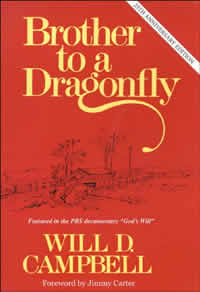Book Notes
 Will D. Campbell, Brother to a Dragonfly, foreword by Jimmy Carter (New York: Continuum, 1977, 2006), 268pp.
Will D. Campbell, Brother to a Dragonfly, foreword by Jimmy Carter (New York: Continuum, 1977, 2006), 268pp.
If you were raised in the south as I was, have an interest in the civil rights movement, or want to enjoy one of the most irreverent Christian curmudgeons ever to irritate the church, then read Will Campbell (b. 1924). Campbell was born and raised in the rural and very poor deep south of Amite, Mississippi, "ordained" by family members at a local Baptist church when he was seventeen, and, in a delightfully improbable life, played a central role as an activist and agitator on behalf of African Americans. But to leave it at that would badly misrepresent him.
After World War II Campbell studied at Tulane, Wake Forest, and Yale. He served as Director of Religious life at the University of Mississippi (Ole Miss), but left after two years because his controversial views attracted death threats. He then did a stint for the National Council of Churches where he worked with most of the civil rights luminaries. In 1957, Campbell was one of four people who escorted the nine black students who integrated Little Rock's Central High School; and he was the only white person to attend the founding of the Southern Christian Leadership Conference by the Rev. Martin Luther King, Jr. So, how did he come to sip whiskey with the KKK and get hate mail from the left?
Campbell came to distrust all movements and institutions, especially the church (he once referred to television preachers as liars, frauds, and "electronic soul molesters"). He dismissed all politics as impotent. It was less than Christian, he realized, to agitate for the oppressed but to hate the oppressor. No, one could not preach what Luther called a "fictitious grace." God loves the redneck Klansmen as well as the disinherited blacks. For the most part, Brother to a Dragonfly tells the story of Campbell's deep love for his brother Joe, and how the latter's tragic demise to alcohol, drugs, and domestic violence led to his premature death. But it was through Joe and an overtly pagan family friend that Campbell had a conversion later in life. Without realizing it, he recalls, his twenty years of ministry had become one of "liberal sophistication. An attempted negation of Jesus, of human engineering, of riding the coattails of Caesar, of playing on his ballpark, by his rules and with his ball, of looking to government to make and verify and authenticate our morality, of worshipping at the shrine of enlightenment and academia, of making an idol of the Supreme Court, a theology of law and order and of not only denying the Faith I professed to hold but my history and my people—the Thomas Colemans [who murdered two civil rights workers]. Loved. And if loved, forgiven. And if forgiven, reconciled." There was all the difference in the world, he realized, between being a "doctrinaire social activist," however laudable, and a follower of Jesus. The key? "I came to understand the nature of tragedy. And one who understands the nature of tragedy can never take sides."
Christian renegade, preacher, author of twenty books and plays, farmer, country musician, friend of Thomas Merton, and agent provocateur, Will Campbell loves a good chew of tobacco and will strike many as enigmatic. Not everyone will appreciate his rapier wit. But PBS profiled him in their documentary "God's Will," in 2000 President Clinton honored him with a National Endowment for the Humanities medal, and Brother to a Dragonfly won numerous literary awards.


